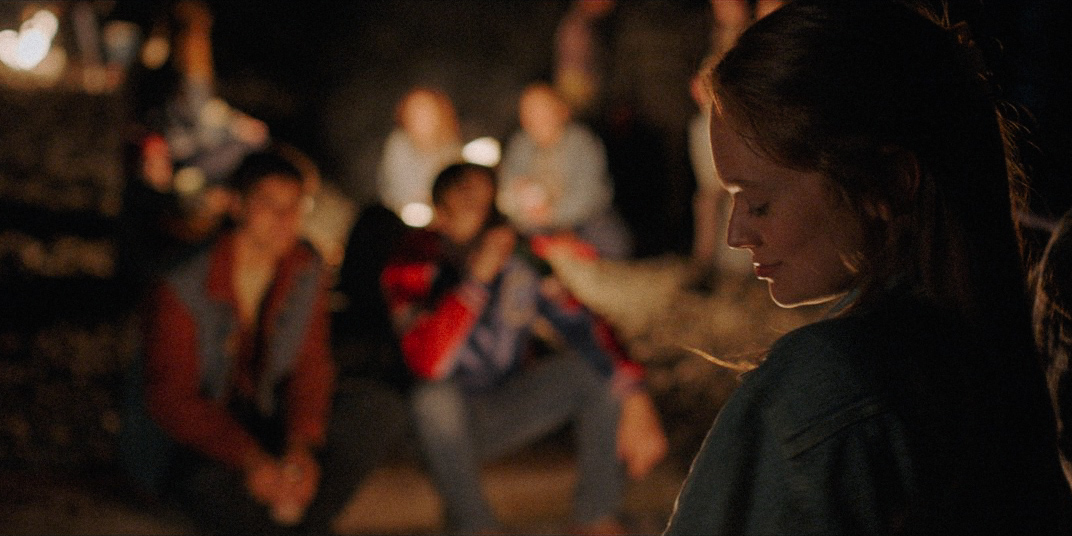[TIFF 2019] REVIEW: ‘Black Conflux’ zooms in on loneliness
Ella Ballantine stars as Jackie in Black Conflux, directed by Nicole Dorsey.
The first thing that struck me about Nicole Dorsey’s feature debut Black Conflux was its use of close-ups: primarily with the camera, but sometimes in the audio, too. Few emerging filmmakers are quite as confident as Dorsey with how she isolates visuals and sounds, like an insect crawling along the ground while high-school-aged girls chat about boys, or the almost unsettling amplification of the sounds of people chewing or drinking. It’s a technique that suggests the film wants to take a detailed, magnified look at hard-to-spot details in everyday life; a method that echoes the feeling that drives the two main characters: pervasive, almost crippling loneliness.
Dorsey’s choices of setting and time period can’t be an accident, either. We find ourselves in the Canadian province of Newfoundland in 1987 (incidentally, I was born two years later in the same place). The implication is that this could happen in any town in Newfoundland, but perhaps not any town in Canada; there’s something about the isolation of Newfoundland as a rocky island in the North Atlantic that helps power the detachment of the characters. Being set in the late eighties is also key: it’s a time when young people couldn’t find kindred spirits as easily via technology, and when expectations about social conformity were much more stifling.
We come upon Jackie (Ella Ballantine), a musically gifted high schooler, and we slowly learn that her home life isn’t ideal: her parents are out of the picture and she lives with her aunt, who means well but is severely alcoholic. On the surface, Jackie is a quiet, intelligent person, but there’s some clear resentment simmering below. She has a hard time identifying with her friends, who find it a lot easier to talk to boys and to go out partying. For almost the entire runtime, the movie exudes a sense of dread that Jackie is on a collision course with something dark and destructive - we just don’t quite know what shape it will take.
Ryan McDonald as Dennis.
On a parallel track - though separated by about ten or fifteen years in age - Dennis (Ryan McDonald) is also floundering. He works at a local brewery, and despite his colleagues’ attempts, any dates they set him up on are either brushed away or abandoned at the last minute. He has a habit of seeing women as promiscuous and therefore not worthy of his attention, while also hating himself for being unable to speak to them. Dennis is filling up with noxious rage that threatens to ruin his life and those around him.
Black Conflux doesn’t include much in the way of plot - we drift between the two leads as a droning score warns of trouble on the horizon. Dorsey seems to have present-day issues on her mind, like recent terror attacks perpetrated by so-called incels, but she’s not applying any such labels to Dennis. We’re meant to witness how small humiliations and failures to connect can metastasize into the kind of criminal behaviour that we’re all too familiar with. The movie doesn’t try to apologize for violence perpetrated by sexually frustrated misogynists, but it tries to depict how it can spawn.
Meanwhile, Jackie remains difficult to categorize. I can’t tell whether I knew people like her or if I shared some of her feelings at certain points in my teenage years (though I certainly didn’t come from a home like hers). In Jackie, Dorsey and Ballantine capture some universal truths of shy, sensitive people, like dealing with friends who want to party when you don’t. And they also preserve things about the time period that we hope would be better handled today. When Jackie confides in her friend Amber (Olivia Scriven) about an encounter with an older boy at a party, Amber’s response is to victim-blame; today, maybe changing attitudes would mean that Jackie could find more support, even beyond her community and online.
Some studies suggest that loneliness is only getting worse as the Internet proliferates and as people retreat into mediated bubbles. The promise of technology as a great unifier hasn’t been delivered on. Black Conflux reminds us that maybe our inability to connect isn’t purely a product of the times, and that alienation can be reversed. Sometimes it’s just a bit of compassion that can pull someone back from the brink.
Black Conflux gets three stars out of four.
Stray thoughts
I appreciated how not everyone in the movie has a strong Newfoundland accent - that’s 100% accurate.
Little details like listening to VOCM radio and lighting bonfires on Topsail Beach are also nice Easter eggs for locals.



